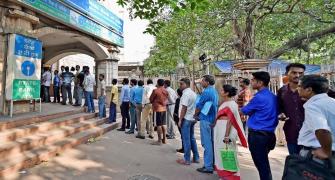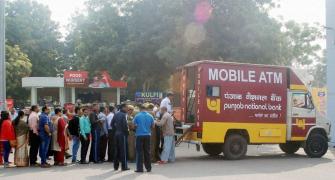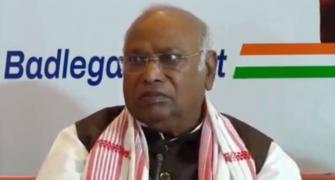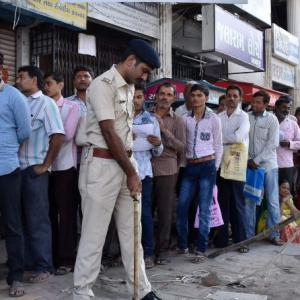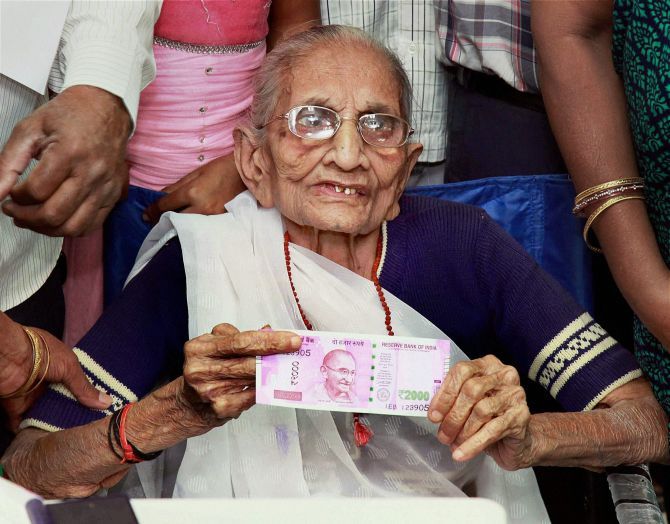
Demonetisation: Real estate resale market hits a wall
Activity in the sale and purchase as well as the rental segments has suddenly come to a standstill reports Raghavendra Kamath and Karan Choudhury.
Manjeet Singh, a mid-level property dealer in South Delhi, has been thinking of changing his line of work.
From making Rs 30,000 to Rs 100,000 in a week, Singh has not been able to even close one deal in the past one week.
Activity in the sale and purchase as well as the rental segments has suddenly come to a standstill.
"People do not have money. Most landlords take rents in cash to save taxes, while a major chunk of the resale market works on cash. This problem will continue for the next few months at least," Singh said.
A week after demonetisation, secondary property markets in the Mumbai Metropolitan Region and the National Capital Region -- the country's top two real estate markets -- have come to a standstill.
Sales in the primary market have halved, brokers and developers told Business Standard.
Prices have remained stagnant as no deals were happening, they said.
"Nobody is buying. They are in a standby mode," said Ankush, a property agent in Vashi who deals with properties in Navi Mumbai, one of the biggest property markets in the MMR. "Prices have not started moving yet."
Sandeep Runwal, director of the Mumbai-based builder Runwal group, said: "People are studying their positions and exchanging currency. Sales have come to a standstill. We are in wait-and-watch mode."
Experts said prices of builder floors and flats in Delhi's Chittaranjan Park, Punjabi Bagh, Greater Kailash have all gone down by almost 25 per cent.
"In Delhi, 70 per cent of the customers deal in cash and the rest in other ways. We have seen a major dip in that 70 per cent, as people have stopped doing any sort of transaction," said Ramesh Khanna, president of the Rajouri Garden main market association.
Online sale, rentals as well as enquires have also taken a major beating. But players in this space said prices of rentals and property prices have not gone down on their portals.
"We have definitely seen a dip in traffic. Sales have been hit hard as well. However, it is too early to say that the property prices and rentals have gone down," said Hitesh Oberoi, managing director and CEO of Info Edge.
In Thane, another big resale market in the MMR, brokers said the situation was same as in Navi Mumbai. "There are no buyers and sellers are ready to negotiate further as they want to clear stocks," said Tariq Siddiqui, a prominent broker in Thane.
Siddiqui said sellers were willing to reduce prices by up to 20 per cent now. Ashok Patel, another senior broker in Thane area, said: "There is some impact on sales. Everybody is on a wait-and-watch mode."
Patel said he expected end-users to come back in a month. "They are waiting to see of prices will come down. Investors have already been out of the market for two years. End-users ultimately want to buy to stay in these houses."
'However, asset quality impact on microfinance/non-banking financiers could last longer.'
'Further, it may take many years for currency in the black market to replenish, hurting real estate/land transaction volumes.'
--Neelkanth Mishra, MD, equity research, Credit Suisse
Tourism sector feels winter chill
An immediate impact is being felt across the industry in new bookings while foreign tourists are troubled due to inadequate availability of local currency, report Ajay Modi and Aneesh Phadnis.
The onset of winter, followed by Christmas and the New Year, is a peak season for the travel industry -- inbound, outbound and domestic.
This year, however, the prospects of the peak season look subdued as a fallout of the demonetisation drive.
The consequent liquidity crunch is especially impacting the large offline travel operators who mostly work on cash for flights, hotel bookings and packages.
An immediate impact is being felt across the industry in new bookings while foreign tourists are troubled due to inadequate availability of local currency.
"Foreign nationals are the worst hit because they cannot go anywhere except the airport to exchange their Indian rupee currency notes. The impact has been more severe on encashments as banks and money changers do not have Indian currency notes to dispense. As a result, none of them is able to exchange Indian rupees for foreign currency," said Anil Khandelwal, chief financial officer, Cox & Kings.
The problem also impacts Indians travelling overseas since forex dealers are seeking high premium for key currencies if one wishes to pay using Rs 500 and Rs 1,000 notes.
Khandelwal said now many leisure travellers are using credit cards to buy forex.
The Archaeological Survey of India, which maintains leading historic monuments, has allowed the use of old Rs 500 and Rs 1,000 notes to pay entrance fees.
"Tourists are seeking refunds and compensation from some of our members as they were unable to access the monuments in the initial days after the demonetisation," said Rajeev Kohli, senior vice-president, Indian Association of Tour Operators.
"We have also requested the government to allow foreign visitors leaving India to freely exchange Rs 500 and Rs 1,000 notes without caps," Kohli said.
Foreign tourists visiting destinations in smaller cities are facing more problems since most transactions in such areas happen in cash.
Itineraries are getting affected, industry executives said. "We believe the situation should ease next week. We don't expect large cancellations from leisure tourists. Business visitors may postpone trips, but leisure tourists plan holidays 6 to 12 months in advance and will not cancel the trips," said Homa Mistry, CEO, Trail Blazer Tours India.
The online travel sector, which is significantly smaller to the offline sector (run by conventional travel agents), has also seen some impact.
"In the first few days after the demonetisation, we saw a decline in traffic to our site. Things are coming back to normalcy though it is a bit slow. The larger impact is on domestic travel where bookings, usually last-minute bookings, happen," said Sharat Dhall, president, Yatra, a leading online travel company.
Dhall said inbound travellers were being advised to change money at the airport so that they have enough Indian currency.
According to Dhall, the online travel industry is bullish about the growth prospects after the demonetisation is settled.
'The government is cracking down on black money, while the implementation of GST will ensure more tax compliance and reduce the amount of money in the shadow economy.'
'However, it will be disruptive in the short term, as India is largely a cash-driven economy.'
--Devendra Joshi, Strategist-Asia Pacific, HSBC
Banks face weak third quarter
But they may emerge stronger in 3 to 6 months, reports Hamsini Karthik.
Just when banks are showing signs of improvement in profit over the June quarter, the banknote ban could affect their earnings.
"December quarter could be bad for banks," warns R Sreeshankar, head of research, Prabhudas Lilladher. "Business for banks and even for non-banking financial companies (NBFCs) could be disrupted in November. There could be a gradual improvement in December," he adds.
While banks could see deposits rise from the banknote ban, which replaces certain old notes with new ones, Vaibhav Agrawal, research head at Angel Broking, points out that loan growth could be hit in December quarter (Q3). This could affect banks in many ways.
First, since cash transactions, particularly in Tier-II and Tier-III cities, may get affected, EMI (equated monthly instalments) payments to banks could fall. EMI is a fixed payment a borrower makes to a lender on the same date of each month.
Also, if loan growth misses the target for Q3, net interest income (interest earned minus interest outgo) of banks may get weaker than expected.
As a result, higher ratio of operating cost to operating income could affect net interest margin (interest earned minus interest outgo divided by earning assets).
Experts say if consumption is disrupted in the near to medium term, the impact could be worse.
Also, analysts at Jefferies point out that in medium term, banks and NBFCs will need to navigate slowdown in retail consumption. They say banking stress in small and medium enterprises could increase, as SMEs typically pay lenders with cash, which is scarce now.
Banks and NBFCs are often seen representing consumption; cash crunch due to banknote ban could mean a retail slowdown, say analysts at ICICI Securities.
On the flip side, as most banks have given customers debit and credit cards, big cities and Tier-II cities may see less fallout from the banknote ban.
But it needs to be seen if a spurt in personal loans and credit cards can arrest weak demand for consumer loans, given that home loans account for 35% to 50% of consumer (individual) loans for banks.
'Most NBFCs and housing finance companies have aggressively given money to the SME segment and loan against property (LAP) segment in the past few years. The estimated LAPs are Rs 250,000 crore or 20 per cent of total home loans. A large proportion of transactions in LAP and SME segments are cash-based. Also, business models of many SMEs are dependent on tax arbitrage generated by cash transactions,' says Jefferies.
Analysts at Motilal Oswal Securities have a similar view. They say that even vehicle lenders may get affected. They say that a combination of all these factors could result in a slowdown in loan growth in the near term, leading to loan quality getting worse off.
But all experts say this phase may be temporary.
"Banks may emerge stronger in the medium to long term," Agrawal says. However, at this point, a switch to banks from NBFCs may be more rewarding.
"Even if NBFC stocks have fallen significantly in the past two days, I wouldn't take fresh exposure in any of them till there is clarity on how they managed business in December quarter," says an analyst at a foreign brokerage.
'We see challenging times for real estate, small businesses and commercial vehicle finance.'
'We don't see non-performing loan risk for consumption businesses, but retail demand, especially for housing, may slow down.
-- Nischint Chawathe, financial analyst, Kotak Institutional Equities
Consumption stocks keep sliding amid note pullback
Top-10 consumption-related companies have lost more than Rs 1.5 lakh crore of market value in the past four sessions, reports Pavan Burugula.
Consumption stocks witnessed another round of selling, with the BSE automobile and realty indices falling over 5% each on Tuesday, November 15, on fears that the banknote ban would disrupt their business.
Even the BSE FMCG and consumer durables indices lost 3% each.
According to the stock exchanges, top-10 consumption-related companies have lost more than Rs 1.5 lakh crore of market value in the past four sessions.
Of this loss, Rs 78,000 crore was on account of auto companies alone.
"Distribution channels of everything, from consumer staples, oil marketing companies, pharmaceuticals to even two-wheelers and tractors, operate primarily in cash. Some parts of the cement and metal value chains also operate in cash. Lack of currency for next two months may result in some of these supply chains freezing for a while, which could suppress demand this quarter," said Neelkanth Mishra, managing director, equity research, Credit Suisse.
The note ban has also hit non-banking financial companies and small microfinance lenders as shortage in cash could impact repayments and worsen loan quality.
For instance, Bajaj Finance shares slumped more than 17% since the note-ban announcement.
Microfinance lenders Bharat Financial Inclusion and Equitas Holdings have lost 23 and 12%, respectively, during the same period.
"Causes for disruption in financing activity would vary across segments ranging from deceleration in consumption demand, concern about decline in collateral values, and inability to provide an alternative payment mechanism when availing loans. We believe these factors will likely affect near-term growth prospects. Timeline for restoration of normalcy is less clear, for now," said Sampath Kumar, head, banking and financial services research, IIFL Capital.
However, some say, despite near-term disruption, the note ban will have a positive impact on Indian markets in the medium to long term.
"Note ban could affect economic activity in the near term, but will be more than outweighed by improved transparency and tax compliance in medium term," said Chetan Ahya, economist, Morgan Stanley.
Since the note ban announcement, the Sensex has lost more than 5% as foreign portfolio investors have sold $1 billion worth of equities, Bloomberg data showed.
'The demand curve is expected to remain weak in the medium term.'
'Private investment should weaken further; a deflationary environment will require more monetary and fiscal intervention.'
'Rate cuts may be on the way, but that can't help change risk aversion in the short term.'
--Govindarajan Chellappa, MD, head of India research, Jefferies
Currency freeze to hit realty funds
The problem will be acute for funds invested in residential projects in tier-2 and tier-3 cities, where cash transactions are higher, reports Ashley Coutinho.
The demonetisation drive is likely to hit the interest repayment capacity of real estate funds, creating a 2008-like situation, when several faced a challenge in returning capital and ended up with single-digit return, much lower than promised.
At present, these instruments are giving 14% to 26% as coupon payment, done quarterly, half-yearly or annually.
The problem will be acute for funds invested in residential projects in tier-2 and tier-3 cities, where cash transactions are higher.
Real estate stocks have slid by 4% to 20% since November 8.
Real estate non-convertible debentures (NCDs) finance developers through a structured debt instrument.
Short-term loans are raised from investors and developers, in turn, give regular interest payout. There are presently about 50 realty funds in the market.
"NCDs are typically raised for residential projects and large projects can get impacted if cash flows are hit. NCD buyers are likely to see rescheduling of cash flows to them. Although there are unlikely to be full-blown defaults immediately, the pace of rescheduling of coupons and principal are likely to increase," said Anubhav Srivastava, managing partner, Block Blue Capital Management.
According to Prateek Pant, co-founder and head of products and solutions, Sanctum Wealth Management, the impact will depend on the mandate of the fund, type of development risk the project is taking, its cover and type of fund structure (equity, debt or mezzanine).
"Developers have to maintain a minimum security cover of 2 to 3 times the amount borrowed, but this is inadequate if realty prices crash 20% to 25% and there is a liquidity squeeze," he said.
Realty funds have raised money at 16% to 26% and these rates will become unsustainable, said experts.
"It is unlikely that the investors and their advisors will accept a lower coupon unless the entire issue is replaced. Mostly, the repayment schedule changes, which will take care of the immediate problem. However, the issue of indebtedness and cash flow crunch will remain. I believe a sustainable interest rate is more in the range of 12% to 14%," said Srivastava.
Experts say significant sums are paid to contractors, suppliers and labourers through cash.
Demonetisation will throttle this supply, especially in residential projects, already facing a slowdown.
There are an estimated 700,000 vacant residential units in the top eight cities.
According to a recent survey by realty consultancy Knight Frank and FICCI, a little more than 60 per cent of respondents felt residential prices would remain the same or worsen by the end of the year.
"We expect a slowing in sales and expect prices to correct 15% to 25% over the next 12 to 18 months, primarily in residential projects," said Pant.
'These factors will likely affect near-term growth prospects.'
'Timeline for restoration of normalcy is less clear, for now.'
--Sampath Kumar, head, banking and financial services research, IIFL Capital
Film ticket sales slip, one screening delayed
Movies that released in the wake of the note ban have seen their box office collections shrink dramatically, reports Viveat Susan Pinto Mumbai.
The note ban has hit the Hindi film market hard.
The $2.32 billion (or Rs 15,500 crore/Rs 155 billion) market is feeling the impact at multiple levels.
One, movies that released in the wake of the note ban have seen their box office collections shrink dramatically.
The key film here is the Farhan Akhtar starrer Rock On 2, whose collections, according to analysts, is estimated at Rs 7 crore to Rs 8 crore (Rs 70 million to Rs 80 million) in the first five days following its release on Friday, November 11.
This, they say, is an abysmal number, since the expectation was that the movie, a sequel to the 2008 Rock On, would do better in the initial week following its release.
The second impact of thye note ban has been on small-budget movies.
Saansein, a horror film, which was to release on November 11, has been postponed to a later date.
The producer of Saansein, Goutam Kumar Jain, said postponement was thought through carefully after taking into account the current circumstances.
Typically, movie-goers in India, especially in small towns and cities, purchase movie tickets in cash.
While credit card and digital payments in urban areas have grown, they still, according to experts, account for a third of ticket bookings in multiplexes.
Demonetisation hits seafood exporters
Indian seafood exports are pegged at $4.7 billion, reports Nirmalya Behera
Seafood exporters are in a quandary after the demonetisation of high-value currency notes as they fear the crisis if prolonged can lead to cancellation of orders.
The government's surprise move to ban Rs 500 and Rs 1,000 notes has left the exporters of the perishable item a worried lot.
The exporters are finding it tough to make the materials available in time at ports for shipments.
"Exporters are unable to make the shipments on time as they are running out of cash to make on-road expenses of trucks carrying the cargo to the ports. There are personal expenses of the drivers, fuelling, road taxes, loading and unloading costs, which are to be met in cash only. On any given day, the expense comes to around Rs 1 lakh to Rs 2 lakh," said Ramesh Mohapatra, chairman, Magnum Seafood and president, Utkal Chamber of Commerce and Industry.
"The government's move will have a natural impact on the exports due to delay in shipments. If we fail to deliver on or before the due date to the customers, the orders may get cancelled," he added.
Indian seafood exports are pegged at $4.7 billion with the US and southeast Asian countries being major importers.
Frozen shrimp is the major export item followed by frozen fish.
The government's move to limit the withdrawal amount and cash transactions will also delay the payments to the workers.
"We will make the payments to the contractors by cheques," said Tara Ranjan Patnaik, chairman, Falcon Marine Exports.
Demonetisation impact: $1 billion worth of gold imported so far since 9/11
Gold jewellery was sold at a premium,. reports Rajesh Bhayani
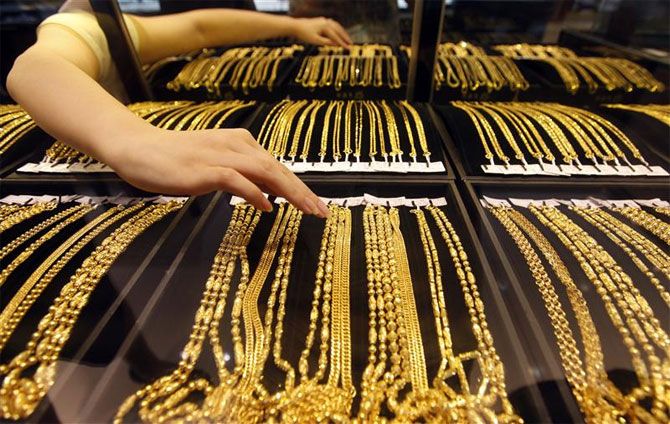 A day after Prime Minister Narendra Modi announced that Rs 500 and Rs 1,000 currency notes would cease to be legal tender from the midnight of November 8, those in possession of unaccounted wealth were seen rushing to jewellers to buy gold.
A day after Prime Minister Narendra Modi announced that Rs 500 and Rs 1,000 currency notes would cease to be legal tender from the midnight of November 8, those in possession of unaccounted wealth were seen rushing to jewellers to buy gold.
While these people were willing to pay huge premiums, jewellers were ready to accept old currency notes.
The transactions took place on past-dated bills; even VAT was paid.
As a result of this rush, there was a sudden spurt in demand for gold.
According to market estimates, as much as $1 billion worth of gold, or around 30 tonnes, has been imported since November 9.
GFMS Thomson Reuters estimates that India's gross official import of gold was worth nearly $1.5 billion as of November 14.
Of this, as much as $900 million worth of the metal was imported after the demonetisation of high-value legal tenders.
While this estimate does not exclude gold imported for exports, such gold would have been a small part of total imports.
It should be noted that the government had last month said that for according the status of a nominated agency, the export of gold jewellery from export-processing zones (EPZs) and export-oriented units (EoUs) would not be taken into account.
The country's import of the yellow metal had stood at about $3.5 billion in October, according to GFMS Thomson Reuters estimates.
The demand for gold had dropped in India during Pitrupaksha, a 15-day period considered inauspicious by Hindus for purchase or sale assets.
But it significantly increased after that period, especially in the days leading up to Diwali.
According to Shekhar Bhandari, senior executive vice-president and business head, global transaction banking and precious metals, Kotak Mahindra Bank, said: "Gold demand has been good since Diwali, and the trend continues. In the past few days, especially amid a marriage season, customers have been seen using debit cards to make payments for jewellery."
This trend is being seen widely among organised or big jewellers.
Meanwhile at Zaveri Bazar, the Indian Bullion and Jewellers Association on Sunday sent messages to jewellers that there was the possibility of the income-tax department asking them to deposit old currency with it by November 15, to stop the malpractice of selling gold at a premium for banned currencies.
The last date for depositing the banned currency notes with banks or exchanges has otherwise been fixed as December 30.
So far, however, there has been no official communication on this from any department, according to Surendra Mehta, Secretary, IBJA.
"No jewellers, to our best knowledge, are accepting old notes now," Mehta said.
Against an average monthly import of 30 tonnes since February, October alone saw an import of an estimated $3.5 billion, or 56 tonnes, of gold.
No one is ready to predict the import trend in the coming weeks, as there are fears that the government might impose a ban on gold imports.
Gold: Lacking lustre in the short term
Analysts expect a correction of 5% to 15% in the coming months reports Tinesh Bhasin.
The uncertainty in gold prices seems to be settling after conclusion of the US polls.
The metal is expected to see a correction soon and in the medium term (one to two years), investors can expect moderate returns.
After the recent currency demonetisation, many jewellers had started quoting a premium on the wholesale gold prices for those buying in cash.
This led many individuals to wonder if there could be a rally in gold going forward. "This was a temporary event, which has settled down after the government increased scrutiny. Individuals can buy gold at the prevailing market price (without additional premium) if they offer their PAN details and pay via card or currency currently in circulation," says a Mumbai-based jeweller.
Negative triggers for gold outweigh positives ones.
There are expectations that the US Federal Reserve will raise interest rates in December, which has led to a stronger dollar. The dollar has an inverse relationship with the yellow metal. The prices, therefore, corrected recently.
"Gold prices usually see a rally during uncertain times. Donald Trump winning by a clear majority has put the uncertainties surrounding the US elections behind," says analyst Bhargava Vaidya of B N Vaidya Associates.
Vaidya feels that gold will remain below Rs 30,000 per 10 grams in the coming months. Gnanasekar Thiagarajan, director at Commtrendz Research, says that depending on rupee movement, gold can even fall to Rs 26,000 per 10 grams.
In India, the international price movement of gold usually has limited effect because of dollar-rupee conversion rates. Thiagarajan is positive on gold from one-two year perspective.
Investment advisers suggest that individuals should only look at gold to diversify portfolio.
In an environment where global uncertainties are affecting the Indian equity market, an investor can keep 10 to 15 per cent of the portfolio in gold.
"The Sovereign Gold Bond Scheme is the best way to invest in the metal," says Ajay Kedia. Individuals get to invest in gold at wholesale prices. SGB gives investors an annual return of 2.50% to 2.75% on the initial investment, paid every six months. There is also exemption from capital gains tax on redemption; the individual doesn't need to spend on storage and one can even take a loan against the bonds."
If you wish to invest in the SGB at present, you'll need to buy on stock exchanges, as there is no ongoing scheme.
The quoted price on an exchange, however, is at a premium to spot gold prices. Analysts suggest that investors should calculate yield to maturity before buying SGB on an exchange.


